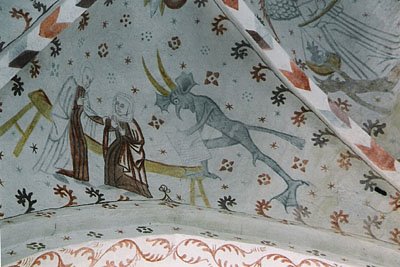
Andørja in Troms
photo: Kai Bachmann
The legend.
Walpurgisnight on April 30th is one of the nights, where witches according to Danish protocols and legends travelled to Troms Church in Norway. The image of the witches' travels to the North was alive among people up to present time, and Troms had a central place in the legends. 'At ride eller fare til Troms' (To ride or race to Troms) was a common way of speech in Denmark, especially in Jutland. The witches rode on fast flying cats, and in the old days people kept their cats indoors before that night. It was told that a cat was found dead in the morning after Walpurgisnight wearing a bridle. In Troms Church the witches had a good time playing games, dancing, eating, drinking and enjoying themselves with the Devil.
Maybe this type of folk tales can be traced back to a papal letter from Clemens V in February 1308. Here is referred to a church in Troms, consecrated to Virgin Mary and situated on the utmost border by the heathens ('sancte Marie de Trinis; iuxta paganos'). A Scottish folklorist and painter, John Francis Campbell (1822-1885) wrote: 'Tromsø was supposed in the olden time to be the headquarters of the Northern witches'.

Fanefjord Church on Møn
Two Women and the Devil
photo:grethe bachmann
The witch trials.
Near Horsens in Eastern Jutland is a place Bjerrelide with a hill , Purhøj . This was once a thingstead ,where 'bystævnet' (the city council) once a year held a meeting, in which they chose an 'oldermand' (master of guild), but it was also a place, where the witches gathered on Walpurgisnight. In one of many witch-trials from 1600s' Denmark, a couple of the accused women admitted that they were upon this hill on Walpurgisnight together with hundreds of trolls and witches, and they were all carried to the hill by she-devils.
In 1623 Kirsten Ibsdatter was sentenced a witch and burnt at the stake in Jutland. From her confession is read that she often used to travel with the other witches to Troms Church. Kirsten told that she had her own demon to divert herself with there. The demon was named Plett (Spot), and as a sign of his pact with Kirsten he put his mark upon her stomach. She told that when all the witches arrived to Troms, the Devil himself was preaching, but he spoke Latin and German, and they didn't understand a word of it. Kirsten had passed on the witchcraft to her son, who often travelled together with the witches to Troms as their servant boy.
How they made those poor women confess to witchcraft is quite another story. One of the attempts was to put a supposed witch in a sack and throw her into the water. If she drowned she wasn't a witch, if she floated she was, and then she was burnt at the stake. So this was a brief respite.
The bonfires.
The bonfireswere lit on the hills to keep people awake in order to avoid them from being taken by surprise by the underground people. Up to the middle of the 1900s Walpurgisnight was still celebrated with bonfires and fun and merriment in Denmark, especially in EasterJutland, but the tradition has almost vanished, and our bonfires are now concentrated on Midsummer's Eve, June 23. (Sankt Hans Aften).
Valborg was the name of an English princess and abbess, who died in 779. She was a nun in Hildesheim in Germany. Her relics were considered miraculous, and they were in 871 transferred to the city Eichstädt.)